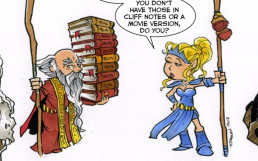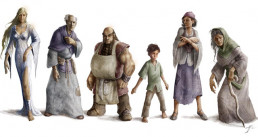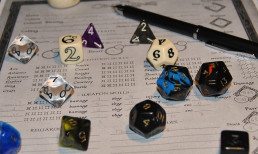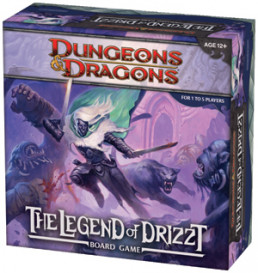Props in Tabletop Games
Utilizing props is one of my GMing trademarks. I think it is a great way to spice things up and keep a story interesting for the players. Whether it’s a one-shot or a campaign you have run for years, props can help the players immerse themselves more fully into the game world and make events more memorable.
However, before you add props to your game, ask yourself why you are doing it. Think about the type of game you are running. Are the players the type that would appreciate a little extra spice? Are they already roleplayers who may just need a little something extra to inspire them? If you have doubts, you might want to bring it up to them first. There are some types of players (*cough* min-maxers *cough*) that won’t appreciate your efforts. If you think your players would benefit from them, consider the setting and tone of your game. What type of props will best serve your needs?
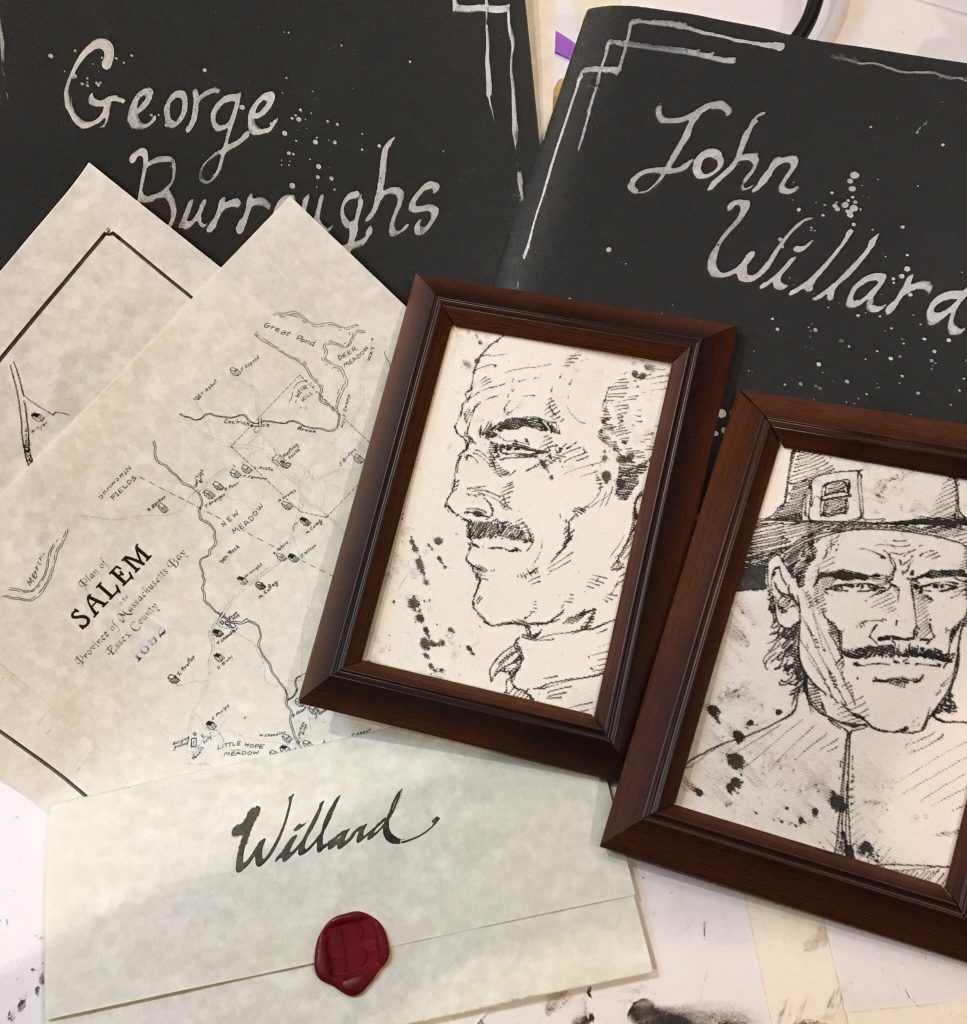 Items from the Story
Items from the Story
Prop items from the story are easily used by the GM to influence the game. The easiest to make are paper items that the characters need, such as maps, letters, paintings and photographs. When I ran a game set in the Salem Witch Trials, I created individual letters for each character that served as their motivation for teaming up to save their town. They also had maps of Salem on parchment paper. Having a contract or wanted poster in their hands immerses the players in the story. These props are really easy to make with the help of a computer and some parchment resume paper. There are a variety of simple methods for aging paper using common household items if you are running a historical or fantasy campaign. Sealing wax or ink stamps are a fantastic touch to finish off important documents.
Other items can also be used to move the story along and give the players information. Books, jewelry, crystals, potion bottles, and so much more! Use your imagination! I made wands and spell books for a Harry Potter game which kept the table lively and in character. It’s much more interesting for the players to study a real book for clues than to roll dice and have you describe what they notice. Once I used jewelry as a way for the party to identify each other as allies. It’s a great visual for them to reference during the game and then is a great souvenir for them after it is over.
Room Decorations
Decorating the table or your gaming room can be a great way to set a specific tone for your game session and it will help players get into character. I suggest starting with the lighting, because that will make the most difference to the vibe in the room. If your players are in a dungeon or if you are playing something like Vampire the Masquerade with a dark tone, turn down your overhead lights. Bring in some other light sources, like table lamps, so that the players can still read their character sheets. Buying colored light bulbs from your local hardware store is another great way to change up the look of a room without moving too much around.
Decorate your table too! We were delighted when one of our players brought candelabras for our Vampire game. They became such a staple of our game that when we couldn’t burn candles anymore, we replaced them with cheap battery powered ones from the Halloween store. Small things like this can give a campaign some unique character and can be fun for the players.
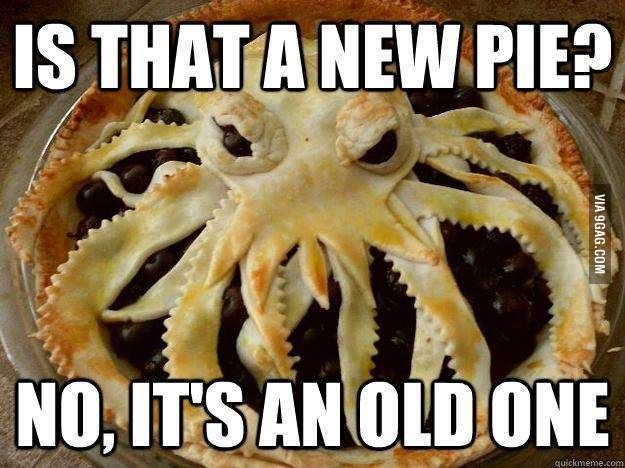 Food & Drinks
Food & Drinks
Providing themed refreshments makes the players very happy. It fills their bellies while also immersing them in the game world. The plates and cups you use to serve the food are also props. I often find myself holding my beverage of choice like my character would hold it, swishing or sipping a pewter mug or wine glass in character as well. There are many resources online with recipes from Star Wars, Lord of the Rings, Star Trek, A Song of Ice and Fire, and other fictional sources. Historical foods are also a great way to add to a campaign. I highly suggest that you test and taste a recipe before serving it to your gaming group!
Costumes
I love costumes, but I am not always a fan of them around the gaming table. Individual items, such as a hat or elf ears, can be a great addition and help a player stay in character. I suggest talking to your group and starting slow. Really consider how each costume piece will add to the game. Goggles or glasses can add a chance for in-character mannerisms, like nervously adjusting them or cleaning them when they are thinking about something. A longsword may be entertaining the first session, but eventually it will probably end up leaning against the wall and forgotten. Full costumes can get uncomfortable or distracting during a game. Plus, why wear a full costume when you only see each other from the table up? Don’t sacrifice comfort and fun to look the part. There are a number of online costume shops that can help find individual pieces for historical and fantasy games, as well as futuristic and science fiction games. I always suggest checking out your local thrift store or Goodwill before dropping a large amount of money online. I’ve put together whole costumes from second-hand stores. You never know what you will find!
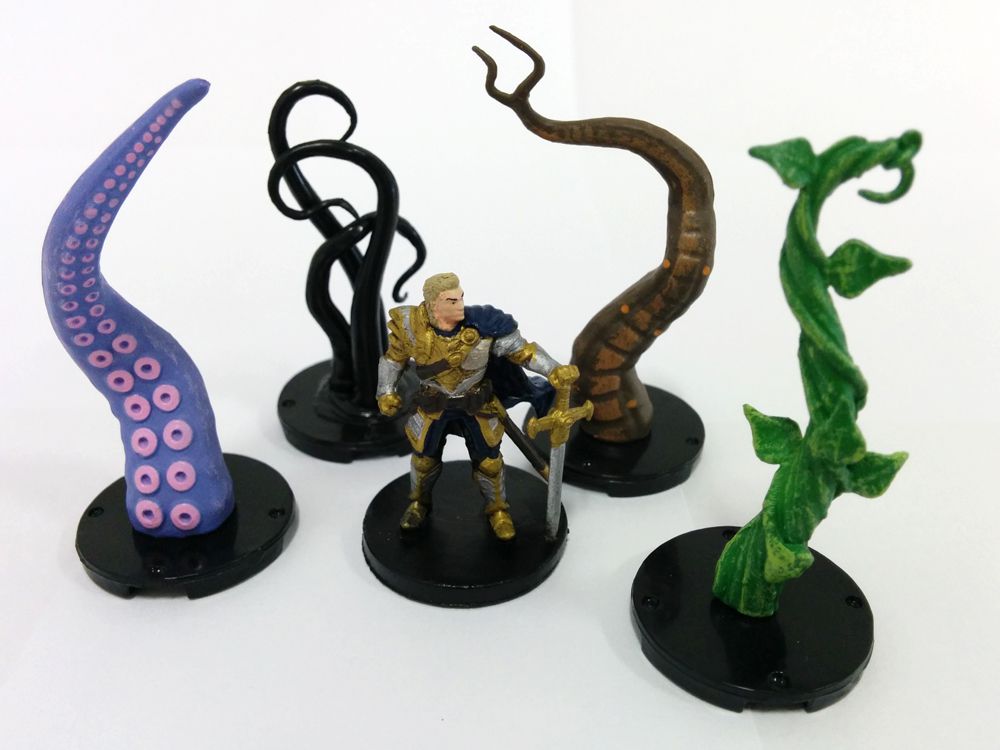 Miniatures
Miniatures
The most common prop in tabletop RPGs are minis. It’s easy to forget that these are props and that they really help with keeping the narrative clear for all the players. The Happy Jacks D&D campaign, Desert of Despair, really made me appreciate how much miniatures help the group visualize what is happening. Having actual spiders or giants to fight, instead of using paper clips or extra dice as stand-ins, can make a big difference. You don’t need to drop a fortune on specific minis for each combat, but using something that is about the right shape is always helpful. If you play D&D or other games that involve miniatures, consider building up a diverse collection of miniature foes for your players to face.
Once you decide that you want to add props to your game, choose carefully! Not all props are created equal! It’s better to add one perfect prop than to drop tons of stuff on the party that will detract from the game rather than add to it. Props will not save a bad game, but if you use them wisely, they can be a fantastic way to add a little dramatic flair to a game.
(This article was first released to Happy Jack's RPG Patreon supporters! Support our show for access to great previews and exclusive content!)
Creating Quality NPCs
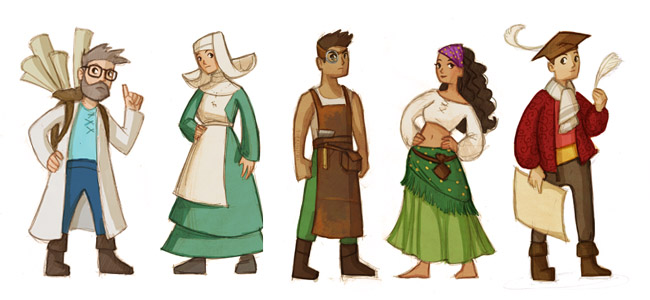 Planning for a game session takes a lot of time. The GM has to anticipate the actions of the players, and do their best to create a story that is challenging and enjoyable. There is a lot of pressure on the GM to create a lot of in-depth content, often with very little turn around time if the group plays multiple times a month. NPCs can be a particular challenge since there are usually a lot of them and players expect them to have personality and depth. So how can a GM create interesting NPCs without spending hours writing their backstories?
Planning for a game session takes a lot of time. The GM has to anticipate the actions of the players, and do their best to create a story that is challenging and enjoyable. There is a lot of pressure on the GM to create a lot of in-depth content, often with very little turn around time if the group plays multiple times a month. NPCs can be a particular challenge since there are usually a lot of them and players expect them to have personality and depth. So how can a GM create interesting NPCs without spending hours writing their backstories?
The fastest way to give an NPC depth is to skin them over a person or character with which you are already familiar. This trick is especially helpful when the party has gone somewhere unexpected and you have to create characters on the fly. It works with personalities that you know from real life, pop culture, literature, or anywhere else! It’s easy to give the fisherman’s wife personality if you model her after your crazy aunt, or to get the mayor to seem planned if you skin him over your favorite Disney villain. Have a list of NPC names ready, and it’s possible to fool the players into thinking that you planned it all ahead of time!
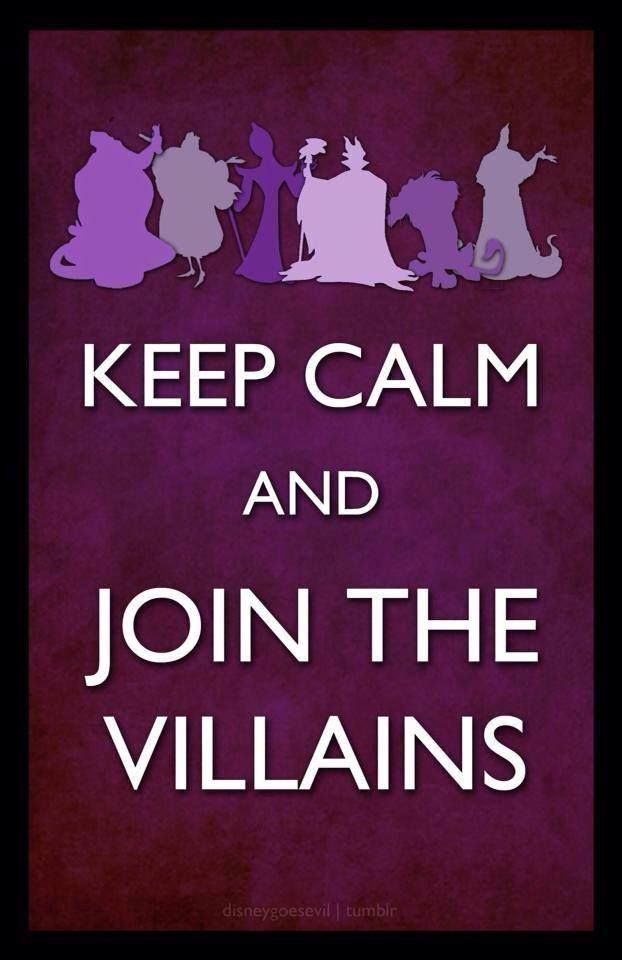 Connecting NPCs to characters you already have in the game is another way to add depth and backstory to them, without starting from scratch. By linking the NPCs to an existing character, a NPC or a PC, you give quick backstory and a frame of reference with which the players can judge them. The young girl they find in the forest ends up being the cousin of the farmer they rescued in the last session, or the town guard served in the military with one of the PCs. This is a great opportunity to bring the PC’s backstories into the game, even if it isn’t a major plot point. These causal connections help make your world feel more real and less episodic. As connections build between NPCs, and between PCs and NPCs, it creates a web that It can also throw some great curve balls at the party when they discover old acquaintances in unexpected places. It’s a great game moment when the party realizes that helping that NPC a few sessions back has unexpected benefits now, or the opposite if you are dealing with a band of murder-hobos!
Connecting NPCs to characters you already have in the game is another way to add depth and backstory to them, without starting from scratch. By linking the NPCs to an existing character, a NPC or a PC, you give quick backstory and a frame of reference with which the players can judge them. The young girl they find in the forest ends up being the cousin of the farmer they rescued in the last session, or the town guard served in the military with one of the PCs. This is a great opportunity to bring the PC’s backstories into the game, even if it isn’t a major plot point. These causal connections help make your world feel more real and less episodic. As connections build between NPCs, and between PCs and NPCs, it creates a web that It can also throw some great curve balls at the party when they discover old acquaintances in unexpected places. It’s a great game moment when the party realizes that helping that NPC a few sessions back has unexpected benefits now, or the opposite if you are dealing with a band of murder-hobos!
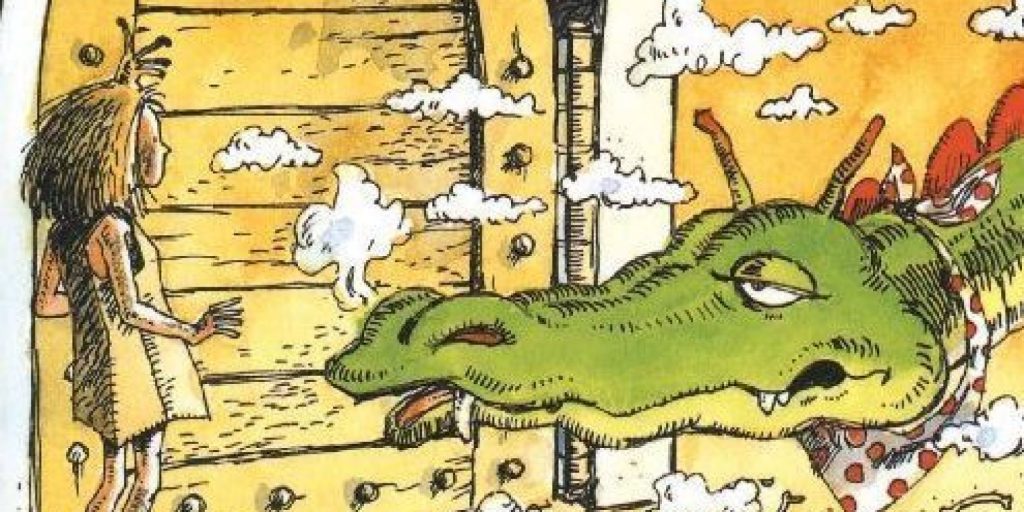 When you do take the time to create deep backstories for characters, it’s always more fun for the players if you avoid classic stereotypes. Not every wizard has to be Gandalf or Merlin. Not every princess has to be a damsel in distress. Make the princess a trained warrior who helps the party instead of waiting to be rescued from the tower. Maybe the wizard was trying to create an immortality spell and is now permanently an obnoxious teenager. NPCs should have disadvantages and flaws, just like any interesting PC. They should also have odd quirks that, although they don’t influence the story, make them unique in the world you have created. Odd collections of items, distinct clothing choices, physical mannerisms, and catchphrases are all great things to build into an NPC. If you are going to spend the time to create an important NPC from scratch, make them worth remembering!
When you do take the time to create deep backstories for characters, it’s always more fun for the players if you avoid classic stereotypes. Not every wizard has to be Gandalf or Merlin. Not every princess has to be a damsel in distress. Make the princess a trained warrior who helps the party instead of waiting to be rescued from the tower. Maybe the wizard was trying to create an immortality spell and is now permanently an obnoxious teenager. NPCs should have disadvantages and flaws, just like any interesting PC. They should also have odd quirks that, although they don’t influence the story, make them unique in the world you have created. Odd collections of items, distinct clothing choices, physical mannerisms, and catchphrases are all great things to build into an NPC. If you are going to spend the time to create an important NPC from scratch, make them worth remembering!
Complex supporting characters enrich the game world and present the group with opportunities for collaborative storytelling. GMs should see them as opportunities as exciting as any combat session. Challenge yourself to keep things fresh and your players guessing with the use of creative NPCs!
(This article was first released to Happy Jack's RPG Patreon supporters! Support our show for access to great previews and exclusive content!)
Tabletop RPGs: Tips for New Players
"I'd love to play D&D but I don't know how and don't want to mess up the game."
I've heard this statement from many people over the years, many of whom became avid gamers with a little assistance. Playing tabletop RPGs is a lot of fun, but it can also be intimidating for new players. Unlike most board games with a set goal and predicable player experience, RPGs change with every choice that the characters make during the game session.
Not having a "right way" or rails to fall back on can make inexperience players feel unsure and self conscious, but don't let that keep you from joining a game!
Nobody learns to play a tabletop RPG without sitting at a table and actually playing.
You can memorize everything about the game, but becoming a good RPG player takes practice. You will learn as you go, and even after playing for decades you will keep learning from new experiences. Just like the characters we play, we get XP as we go!
It always helps to have some guidance though, and so, I'd like to impart some knowledge that will be helpful to new players.
Who is in charge?
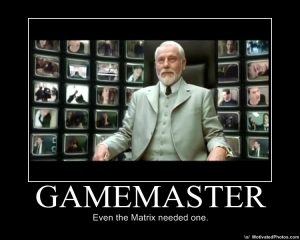 The Game Master (GM), or Dungeon Master (DM) if you are playing D&D, is in charge of running the game. It is their job to make sure that the game is engaging, follows the system's rules, and that everyone is having fun. They are, in many ways, the "god" of your game world. They create the setting, non- player characters, monsters, situations and everything else that you and your fellow players will face in the game.
The Game Master (GM), or Dungeon Master (DM) if you are playing D&D, is in charge of running the game. It is their job to make sure that the game is engaging, follows the system's rules, and that everyone is having fun. They are, in many ways, the "god" of your game world. They create the setting, non- player characters, monsters, situations and everything else that you and your fellow players will face in the game.
It is important to note that the GM does NOT get to make your choices for you.
They can create the dungeon with a dragon inside, but they cannot make your character walk in and slay it. That has to be your choice. If you want your character to head to the local tavern instead, you have that right! (But I can't guarantee the GM won't turn around and make the dragon attack the tavern!)
It's a good idea to befriend your GM. They are the best resource for everything related to your campaign and can help you with any questions you have along the way. Work closely with them as you learn the system and show your appreciation for all the hard work they put in to keeping the game going. You show up and play once a week, but they spend hours prepping before every session. Without the GM, there is no game.
How do I build my character?
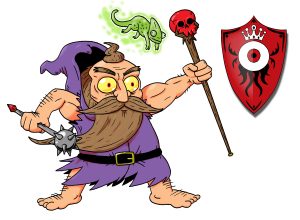 I could write a whole post about creating a character (and I probably will in the future!) but for now, I will try to keep it short and sweet.
I could write a whole post about creating a character (and I probably will in the future!) but for now, I will try to keep it short and sweet.
Talk to your GM before you start making your character and ask for their advice. Different games have different flavors and you don't want your character to bring a gun to a magic fight, or be an evil character in a group of holy paladins. Or maybe you do want that, but you should get permission from your GM before adding that type of complexity to the game.
All systems have a set of mechanics to help you build a character's abilities, so make sure that you read that section of the players handbook thoroughly. If you have questions about the process, your GM and fellow players are your best resource to help you make your character. There are also many online forums where you can ask any questions that you might have during character creation.
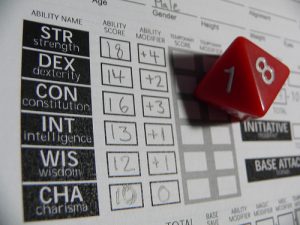 Make sure that your character's stats (strength, intelligence, etc) support the skills and abilities that you select for them. For example, most fighters will need a lot of physical stat points, such as strength and constitution, while magic users or investigation types will need more intellectual stats. It's not helpful to have a fighter who isn't strong enough to wear their armor! Chose your stats and abilities wisely, because they change slowly once the campaign starts!
Make sure that your character's stats (strength, intelligence, etc) support the skills and abilities that you select for them. For example, most fighters will need a lot of physical stat points, such as strength and constitution, while magic users or investigation types will need more intellectual stats. It's not helpful to have a fighter who isn't strong enough to wear their armor! Chose your stats and abilities wisely, because they change slowly once the campaign starts!
Next, develop your character's personality. Hopefully, you had something in mind while you were working on his/her stats and skills. Some game systems have personality stuff built in to character creation which give you a basic framework for a personality and back story. If so, great! Just use that as a basic structure and add in some smaller details. If not, you have a bit more to do to create your character.
What can my character do?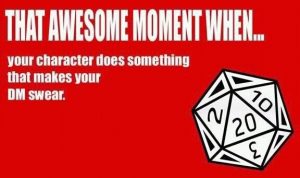
Your character can TRY anything that you'd like, but they won't always succeed. Take chances and think out of the box. Every problem should have multiple solutions. Success is determined by your dice rolls and the GM's choices. Choose wisely! Saying, "I shove a sword up his butt!" may not be as funny as you expect when it actually happens in the game.
Be an active participant!
Tabletop RPG game sessions can last a long time, usually several hours for a single session. The time can sometimes pass slowly, especially during combat, it's important to take an ACTIVE interest in everything that is happening during the game. That means listening and participating in character, maybe even taking notes so that you can remember important details later.
Combat can take time, but it's important that you are paying attention to what other players are doing on their turns!
There is nothing worse than being in the midst of a difficult combat and having a player do something useless because they have no idea what the last player did on their turn. Be aware of what players are doing so that you can make good tactical choices and contribute to the battle!
What is metagaming? Why is it bad?
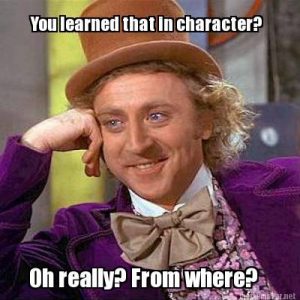 Metagaming is making decisions based upon out of game knowledge. For example, you saw your GM's notes and know that there is a dragon in the dungeon. If you have your character avoid the dungeon, you are metagaming. Your character doesn't know there is a dragon waiting to eat you. You are using PLAYER knowledge to make a choice in game, not CHARACTER knowledge. For obvious reasons, metagaming can really mess up a game. DON'T DO IT!
Metagaming is making decisions based upon out of game knowledge. For example, you saw your GM's notes and know that there is a dragon in the dungeon. If you have your character avoid the dungeon, you are metagaming. Your character doesn't know there is a dragon waiting to eat you. You are using PLAYER knowledge to make a choice in game, not CHARACTER knowledge. For obvious reasons, metagaming can really mess up a game. DON'T DO IT!
Ask Questions!
Nobody expects you to know everything! Asking questions, in character or out of character, is a natural part of the game. Everyone does it, no matter how long they have been playing. Why do you think gamers carry around the game rule books all the time?
The Legend of Drizzt Board Game
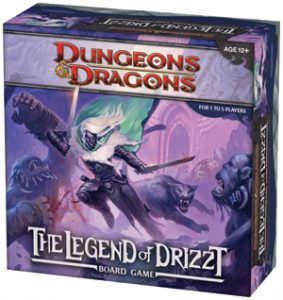 I don't know anything about Drizzt, so when my friends pulled out The Legend of Drizzt board game at a recent tabletop night, I was a bit clueless. I didn't know anything about the characters or the setting, but it didn't matter. I ended up having a great time.
I don't know anything about Drizzt, so when my friends pulled out The Legend of Drizzt board game at a recent tabletop night, I was a bit clueless. I didn't know anything about the characters or the setting, but it didn't matter. I ended up having a great time.
The game is basically a GM-less dungeon crawl. Each player takes a turn playing their character, but then they play the dungeon. To do this, they draw tiles from a pile which randomly add on to the dungeon and change the layout. The player also has to draw from a pile of challenges that will make moving through this new tile challenging, usually this is in the form of a trap. This leads to surprisingly challenging encounters, and although it doesn't lead to the most creative game, the random elements add a lot of excitement to the game.
The combat is easy to pick up and very familiar to regular RPG players. It can also be very challenging since new traps, monsters, and parts of the dungeon are exposed each turn. Some of the monsters are pretty challenging, and the traps and monsters pile up quickly! I really enjoy the slow reveal of the dungeon as players draw tiles nearly every turn. It gives a feeling of suspense that is missing from a lot of minis games, because most GMs simply have the map sitting out in its entirety. I definitely loved the exploration and will try to replicate this feeling in my next game with a dungeon map.
The characters are well balanced, and there are even pregame power choices that make them somewhat customizable. I played an archer, and chose a really powerful shot that blew the target into another dungeon tile. It really became a valuable asset during the big fight at the end, and the game would have played out very differently if I had selected another power. Ever the advocate of player empowerment, I was delighted and surprised by this addition to a board game. There isn't really a role-playing aspect to the game, despite its DnD inspired theme. My usually RP-heavy gaming group did almost none, only occasionally thinking about their characters loyalties when deciding who to aid first in combat. This game is basically an old fashioned dungeon  crawl, with a simple objective, a series of deadly rooms, and a boss lurking somewhere up ahead.
crawl, with a simple objective, a series of deadly rooms, and a boss lurking somewhere up ahead.
I'm definitely planning on buying this game for myself when I pickup my next paycheck. It was great for an impromptu game night. It would also be a great backup for any gaming group in case the GM misses a session or isn't able to prepare an adventure one week. I plan on taking it to future conventions to fill empty time if I don't get into games. Since everything is based on random selection, you can never play the same exact game twice! It also comes with many different ways to run the game to keep it fresh. The Legend of Drizzt board game doesn't match the fun of a real RPG session, but it captures the RPG flavor without any prep time.
You can get a copy of The Legend of Drizzt at Amazon for about $50.
(This article was originally posted on CharismaBonus.com)
Acquiring Accents for RPGs
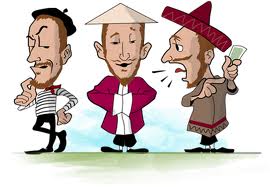 Accents are one of the most powerful tools in a role-player's arsenal. Using them can make characters stand out at the gaming table, and differentiate between in character and out of character comments. They can also be the difference between a good GM and an incredible GM who truly immerses players in their world. Why narrate a story? Bring out your inner thespian and BECOME your story.
Accents are one of the most powerful tools in a role-player's arsenal. Using them can make characters stand out at the gaming table, and differentiate between in character and out of character comments. They can also be the difference between a good GM and an incredible GM who truly immerses players in their world. Why narrate a story? Bring out your inner thespian and BECOME your story.
First of all, research whatever accent you'd like to try, or shop around for an accent that you can mimic fairly well. One of the best tools for listening to accents is the internet, specifically videos. Search for "regional dialect meme" on Youtube and you will get a ton of options from all over the world. This meme is particularly helpful because it includes many words and sounds, but it also includes regional terms. For example, is it "soda" or "pop"? These terms can be awesome little details to add to your characters and really unify a group of characters that are from the same place.
Remember, it's ok if you aren't perfect at first, and you really will get better as you go. Hell, it's an RPG! Unless you are playing a historical game, who's to say your accent isn't perfect? Maybe the people from that land over the mountains sound exactly like your bad Jamaican accent. There are a large number of Russian/Irish accented characters in my games... who start to sound more Irish as I drink. Go fig.

Accents are regional, not racial. In a recent season of the Happy Jack's RPG Podcast, another host started speaking like a southern character from one of our games. The character was named Windy Drawers, and he was a sloppy, overeating, unintelligent politician. We instantly started receiving angry emails from people who were upset that we were depicting such an unflattering African American stereotype on our show, however we had never mentioned Windy Drawers' race on that episode of the podcast. In our game he was actually a rich southern white man, but listeners drew their own conclusions based on their own racial stereotypes. Let me say it again, accents are regional, not racial. They are determined by where you grew up and lived, not by your ethnicity or species.
This is a very important distinction that is often overlooked in gaming... and in the media. The stereotypical dwarf may have a Scottish accent, but if he was raised by elves (oh, the horror!) he will sound more like an elf than his dwarf kinsmen. Humans from different parts of the world should have different accents, and drow should not sound like surface elves... unless they were raised together! A good player or GM will use this in their games. An NPC shows up claiming to be from a local town, but speaks differently than everyone there... clue #1 for the party. Maybe it's your half-elf's first adventure with this band and you're getting to know them along the way? Your Irish/British/Russian/common accent tells them that you were raised by the human side of the family, not the elves. They add depth and complexity to a character instantly, that could only otherwise come from sharing written back stories or long in-game explanations.
Here are some easy tips for mastering an accent:
- Find a phrase that will immediately bring you back into your accent. Usually, this is something very stereotypical that you almost can't imagine being said in any other accent. For my Irish accent I use the phrase "Jesus, Mary, and Joseph!" because it's VERY Irish, and it's easy to fit into many different situations. It's like hitting the refresh button on my Irish lilt.
- Listen to your chosen accent as much as possible. Watch Braveheart 4 more times, or whatever movie has the accent you are trying to mimic. Audio books are also a great option since they are easy to get and reasonably priced. The more you hear the accent the easier it will be for you to imagine it in your head later when you are trying to use it.
- Practice! The more you use your accent, the better it will sound. Talk along with your favorite movie character with that accent, repeat commercials on the radio or read street signs while you're driving in the car. I practice in the car a lot because nobody can hear how awful I sound.
- Anticipate what words you are going to use a lot in the campaign and practice them extra! For example, if you are a German spy in a pulp game, you might be dealing with lots of military equipment, location names, etc. You will probably never have to use the words "elf", "dwarf", or "dragon", so stick to what you'll need. Bonus points for learning and using regional terms or words from their native language!
- Did I mention that you should practice? Seriously, do it. You don't want your first try at an accent to be while you're sitting at the gaming table. Trust me on this, I learned this the hard way.
Hollywood & Heroes Charity Event
![]() The Emerald Knights comic and game shop is hosting a huge event this Sat, June 9th from 12pm to 7pm. The event supports the Shriner's Hospital for Children, so join us for the fun and some good karma. It will be a day of games, signings, photo opps, and much more! Lots of geek-famous actors will be there, including members of The Guild, and over 40 cosplayers, including myself! There are also items being auctioned off on the EK auction page.
The Emerald Knights comic and game shop is hosting a huge event this Sat, June 9th from 12pm to 7pm. The event supports the Shriner's Hospital for Children, so join us for the fun and some good karma. It will be a day of games, signings, photo opps, and much more! Lots of geek-famous actors will be there, including members of The Guild, and over 40 cosplayers, including myself! There are also items being auctioned off on the EK auction page.
I will be dressed as Wonder Woman all afternoon. I will also be playing in some RPGs, spreading word about the Happy Jack's RPG podcast, posing for pictures, and visiting with everyone. Rumor has it that I may also be running a DC themed Wild Talents game...
I hope to see a lot of familiar faces on Saturday! More info can be found on the Emerald Knights website, or by contacting the shop.
Farewell to Fear... or Fun?
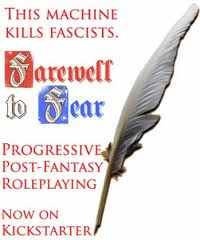 Many people love to complain about what is wrong with the world, but do little or nothing about it. That is not the case with David Hill Jr. of Machine Age Productions. He didn't like the accepted norms of the average fantasy RPG's setting, so he created a completely new RPG system. His new game, called "Farewell to Fear", has raised over $16,000 on Kickstarter, and focuses on bringing political correctness to the RPG fantasy genre. David claims his game is a "Progressive Post-Fantasy RPG". What does he mean by that? Well according to his Kickstarter page:
Many people love to complain about what is wrong with the world, but do little or nothing about it. That is not the case with David Hill Jr. of Machine Age Productions. He didn't like the accepted norms of the average fantasy RPG's setting, so he created a completely new RPG system. His new game, called "Farewell to Fear", has raised over $16,000 on Kickstarter, and focuses on bringing political correctness to the RPG fantasy genre. David claims his game is a "Progressive Post-Fantasy RPG". What does he mean by that? Well according to his Kickstarter page:
Fantasy’s full of all sorts of legacy concepts that are rather disgusting to us; sexism, classism, racism, institutional violence, those are just a few choice items. Farewell to Fear is a game about revolution, about taking fantasy out of the dark ages through drive and action.
Think punk rock meets fantasy. Bad Religion meets Tolkien, boot to face.
Don't get me started on that last comment. It shows a total lack of knowledge of Tolkien's work or its revolutionary impact on the fantasy genre.
Although the information I can find is rather ambiguous, it seems like the focus of this game will be for players to portray normal people, fighting against political incorrectness and unfairness. I applaud Mr. Hill for spending so much time creating a game that embodies so many of his personal beliefs, but despite my love of new tabletop systems, I don't think I want to play his game.
 Why? Because it sounds like every other fantasy game out there, only with more limitations on plot, overall creativity, and roleplaying. The entire concept of this system is that the PCs fight against "the man", who we assume is to blame for the sexism, racism, etc. Already that drastically limits the creativity of the GM to create plots because they have to be about social justice. It also drastically limits the types of characters that the players can create because the PCs have to have the desire to fight the wrongs in society, but not be afraid to rebel against the current institutions that are in place. Party conflict and drama is going to be pretty hard to drum up in a group of incredibly similar characters. Maybe they can't agree on whether to fight racism or sexism today?
Why? Because it sounds like every other fantasy game out there, only with more limitations on plot, overall creativity, and roleplaying. The entire concept of this system is that the PCs fight against "the man", who we assume is to blame for the sexism, racism, etc. Already that drastically limits the creativity of the GM to create plots because they have to be about social justice. It also drastically limits the types of characters that the players can create because the PCs have to have the desire to fight the wrongs in society, but not be afraid to rebel against the current institutions that are in place. Party conflict and drama is going to be pretty hard to drum up in a group of incredibly similar characters. Maybe they can't agree on whether to fight racism or sexism today?
It seems like the whole "Farewell to Fear" concept would be better suited to be published as an adventure path, rather then a game unto itself. They claim that the scientific method is the inspiration for their main mechanic.
The main game system is inspired by the scientific method. Instead of a huge focus on pass/fail mechanics, we’re mostly concerned about finding solutions through conjecture, precedent, and experimentation.
Ok, but how do I hit that guy over there with my sword? The actual dice mechanic spelled out on their Kickstarter page is rather vague, but it doesn't sound very revolutionary to me (unless you've never played anything but D&D). Why design a completely new set of mechanics for something that could easily be used as a skin to lay over an existing, proven system? If you want something other than a pass/fail mechanic, check out the ORE system. For that you roll for the speed and quality of your action, and it is very applicable to situations like archeological digs, performing music, or very intense combat. Why reinvent the wheel? And how many times are your players going to want to play with that same wheel if you put it on a track with limited customization?
over an existing, proven system? If you want something other than a pass/fail mechanic, check out the ORE system. For that you roll for the speed and quality of your action, and it is very applicable to situations like archeological digs, performing music, or very intense combat. Why reinvent the wheel? And how many times are your players going to want to play with that same wheel if you put it on a track with limited customization?
As a woman of mixed ethnicity, I've experience my share of discrimination in my life. I am wholeheartedly against any type of discrimination, hatred, or unfair treatment between players at the gaming table. A game that could fight the imbalance at the table but still be fun would be truly revolutionary. This game does not fight the inequality that happens to players, it only lets them fight injustices that happen in an imaginary Medieval Europe-based world, which is possible in almost any RPG if the GM wants the story to go that way. In fact, it reminds me of quite a few GM created games that I've played in (and created) for D&D4e, Wild Talents, Traveller, and other systems. (This project's Kickstarter video also claims that peasants in the middle ages studied laws to better their situations, and that women held more power than men... as a Medieval history teacher, I'd love to see their sources for that info...)
 My big question? If you are trying to break the traditional RPG mold, why would you choose the most stereotypical setting possible as a foundation? Mr. Hill claims to be improving on the traditional Tolkien fantasy model (sorry... I can't just let that slide) but it sounds like he wants players to behave just like Sam and Frodo. They are normal folk, facing the evils of this world to protect their village's freedom. Or just like Gandalf, who despite being a virtual demi-god, puts the future of Arda in the hands of a minority group (hobbits). Maybe Mr. Hill has forgotten these small plot points, or how Gimli and Legolas broke down the barriers of hatred between their two races and became lifelong friends? Or Eowyn, a noblewoman who successfully kills the Lord of the Nazgul!?!?! I told you not to get me started...
My big question? If you are trying to break the traditional RPG mold, why would you choose the most stereotypical setting possible as a foundation? Mr. Hill claims to be improving on the traditional Tolkien fantasy model (sorry... I can't just let that slide) but it sounds like he wants players to behave just like Sam and Frodo. They are normal folk, facing the evils of this world to protect their village's freedom. Or just like Gandalf, who despite being a virtual demi-god, puts the future of Arda in the hands of a minority group (hobbits). Maybe Mr. Hill has forgotten these small plot points, or how Gimli and Legolas broke down the barriers of hatred between their two races and became lifelong friends? Or Eowyn, a noblewoman who successfully kills the Lord of the Nazgul!?!?! I told you not to get me started...
I wish "Farewell to Fear" the best, but given the current information, I see very little that is truly original in this project.
RPG Podcast Listener Survey
 The 2012 RPG Podcast Lister Survey is up! Please visit rpgpolls.com to fill it out. This information is very useful to podcast hosts and gives great information on the demographics of our audience members. It should take you less than 5 minutes to fill out and doesn't ask for any personal contact information.
The 2012 RPG Podcast Lister Survey is up! Please visit rpgpolls.com to fill it out. This information is very useful to podcast hosts and gives great information on the demographics of our audience members. It should take you less than 5 minutes to fill out and doesn't ask for any personal contact information.
The 2011 survey gave us some very interesting information about RPG podcast listeners. According to last year's statistics, RPG podcast listeners are between the ages of 26 and 29. 51% of them are married and over 66% use iTunes to download their podcasts. D&D was still the most popular gaming system of listeners, but had dropped 2.3% while other systems such as Savage Worlds and GURPS gained ground. Overall, listeners spent an average of $621.92 on RPGs and gaming in 2011. Women made up only 6% of respondents in last years survey, however the actual number of women who took the survey increased.
Happy Jacks RPG Podcast did very well in the 2011 survey. Over 27% of the gamers surveyed listened to our podcast!! We actually ranked 3rd in the list of top 20 RPG podcasts! Most surprising of all, Happy Jack's was the favorite RPG podcast of women who took the survey. Over 33% of the women who completed the survey listened to our podcast! This makes me very happy, since I am a huge proponent of women in gaming.
I am eagerly looking forward to the results of the 2012 survey! Please share this info with your gamer friends! The more respondents, the more accurate the data will be!
